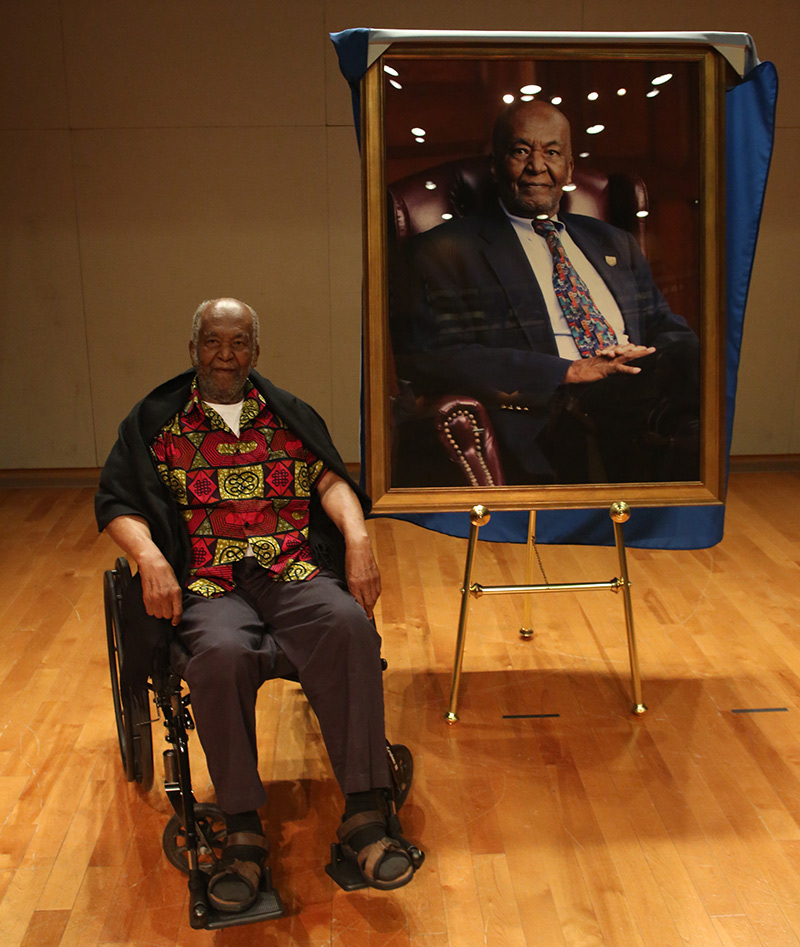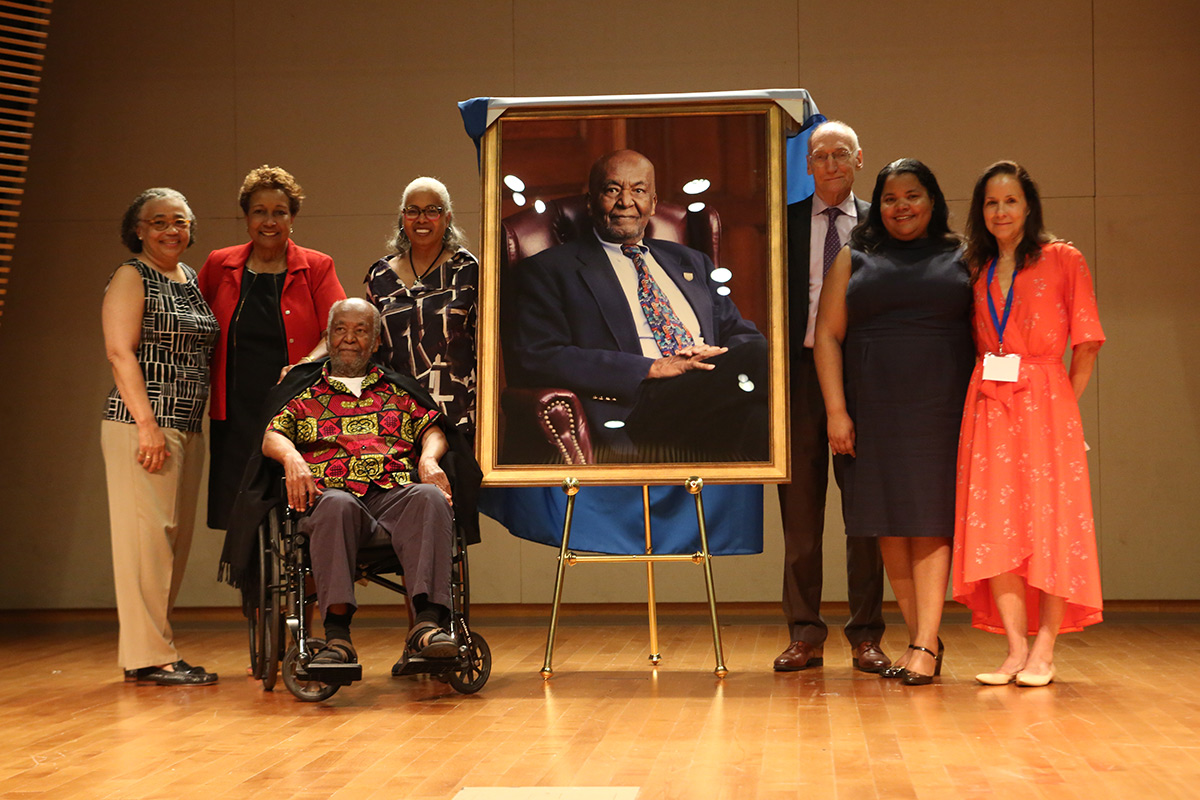It was already a given that Edmund W. Gordon’s towering achievements as a psychologist, scholar, mentor and champion of racial equity will shape the work of Teachers College far into the foreseeable future.
But with the formal unveiling this past Monday of his magisterial official portrait, taken by the Columbia University photographer Bruce Gilbert, the 98-year-old Gordon – the College’s Richard March Hoe Professor Emeritus of Psychology & Education, and founder of its Institute for Urban & Minority Education (IUME) – will literally be a presence on campus in perpetuity.
And that seems especially fitting for someone who first arrived at TC as a student in 1950 and to whom, as TC President Thomas Bailey put it, “the normal rules of time do not apply.”
“Consider, first of all, that this is a man who was mentored by the sociologist and pan-Africanist W.E.B. DuBois – himself born in 1868,” Bailey said, as Gordon himself looked on at a special ceremony held in Cowin Auditorium following the sixth annual Edmund W. Gordon Lecture, delivered by critical race theorist Gloria Ladson-Billings. “Where others’ lives and careers have followed a predictable arc of promise, productivity, peak performance, and gradual decline, a graph of Edmund Gordon’s contributions would consist of a single, astonishing, continuously rising line.”
Bailey hailed Gordon for his vision of supplementary education – “the scaffolding of experience to provide disadvantaged young people of color with exposure to museums, theater, zoos and all the other extra-curricular learning and enrichment that their wealthier white peers absorb as a matter of course.” And he went on to describe Gordon at work throughout the decades: in the 1950s, cofounding, with his wife, the physician Susan Gordon, a comprehensive health clinic that anticipated efforts such as the Harlem Children’s Zone; in the 1960s, serving as a research director of the federal Head Start program and helping to write the first Elementary and Secondary Education Act; and on into the 2000s, when he served as TC’s Vice President of Academic Affairs and Dean, and, subsequently, chaired the Gordon Commission of the Educational Testing Service, which recommended sweeping changes in educational assessment.
Where others’ lives and careers have followed a predictable arc of promise, productivity, peak performance, and gradual decline, a graph of Edmund Gordon’s contributions would consist of a single, astonishing, continuously rising line.
—Thomas Bailey
“It’s a remarkable record of achievement, and in so many ways, Ed’s vision and work have increasingly served as a road map for Teachers College over the years,” Bailey said. The unveiling of Gordon’s portrait he added, would be “a formal, permanent affirmation that the beliefs, ideas, methods and monumental accomplishments” of Gordon “are fundamental” to TC’s “highest ideals of what it aspires to be.”
TC Professor of Sociology & Education Amy Stuart Wells. who followed Bailey to the podium, spoke movingly of her personal connection with Gordon – one that many other TC faculty members have shared.

AS SHARP AS HIS LIKENESS Gordon kept his remarks short, but couldn't resist sharing insights gleaned from his mentor, W.E.B. DuBois. (Photo Credit: Bruce Gilbert)
“As much as I adore and admire so many of my TC colleagues, there is not one of them that I would rather walk by every morning and every late night, smiling at me from a portrait on the wall and reminding me that I am here to provide the best education possible to our TC students,” said Wells, Director of TC’s Reimagining Education Summer Institute, which had just concluded the first day of its 2019 iteration. Gordon, Wells said, is TC’s Gandhi, teaching others, in the Mahatma’s words, “to be thoughtful, gentle and fearless.”
As much as I adore and admire so many of my TC colleagues, there is not one of them that I would rather walk by every morning and every late night, smiling at me from a portrait on the wall.
—Amy Stuart Wells
“None of us would be here today, doing the critical work of IUME and the Reimagining Education Summer Institute, that together leverage the research and expertise of the TC faculty to impact practice had we not been taught how and why we do this by him,” Wells said.
She added that, for her, Gordon personifies the word “scholar” – the meaning of which, she said, standard dictionary definitions fail to capture.
“A scholar is someone who has a deep and penetrating insight into everyday issues that require more systematic, interdisciplinary examination and synthesis,” Wells said. “A scholar is someone who can somehow manage to get one of the largest testing companies in the world to fund a commission of prominent researchers to critique standardized testing as the central form of assessment and accountability in our educational system. And a scholar is a colleague who teaches his colleagues about work-life balance, the responsibility of parenting, the importance of family – one who sends happy Mother’s day text messages that make this colleagues smile.”
Still another speaker, Eleanor Armour-Thomas – a former student of Gordon’s who is now Professor of Educational Psychology at Queens College and the Graduate School and University Center of the City University of New York – recalled her first encounter with Gordon more than 40 years ago, on the first floor of what is now TC’s Zankel Hall.
“I was so anxious and befuddled,” Armour-Thomas said. “And then here comes Dr. Gordon in his dashiki and beard, and he says, ‘Young lady, may I help you?’ He calmed me down – and little did I know I would walk into my first classroom and there he’d be, my professor and the chair of the department.” She turned to Gordon, who sat on stage in a wheel chair. “And here we are, my mentor, friend and colleague, and I owe you such a debt of gratitude.”
I was so anxious and befuddled. And then here comes Dr. Gordon in his dashiki and beard, and he says, ‘Young lady, may I help you?’ He calmed me down – and little did I know I would walk into my first classroom and there he’d be, my professor and the chair of the department.
—Eleanor Armour-Thomas
Indeed, Armour-Thomas added, “mentoring does not end at the student level.
“Even at this late stage of my life, I still look to Dr. Gordon for mentoring. In fact, we have a lunch date this Friday.”
Finally came the moment that Bailey described as “nothing less than a consecration,” when Erica N. Walker, TC’s Clifford Brewster Upton Professor of Mathematics & Education – a Gordon protégé who serves as IUME’s current director – formally unveiled his portrait. There were murmurs and applause at the framed photograph, which shows Gordon, seated, surveying the world with a searching and powerful gaze. And then the man himself took the microphone, and his words were as clear and sharp as his likeness.
“I’m not going to say much, he said. “Though one of the things you didn’t say much about was my time as a Presbyterian minister – and we don’t typically pass up the opportunity to speak.”
Gordon recalled that, earlier in his career, he asked on of his mentors, Stella Chess – a child psychiatrist at New York University – the secret to becoming good at that profession.
“She said, ‘It’s knowing how to choose good patients,’” Gordon said, to laughter. “And the relevance of that is that I’ve learned that you don’t try to give a serious talk after a speaker like Professor Ladson-Billings.”
Still, he couldn’t resist adding that, while he and Ladson-Billings agree on much, they differ in the degree to which they emphasize race.
“One thing I learned from DuBois is that, as important as color is, the key problem for the 21st century will be the line between those who have and those who do not.”
—Edmund W. Gordon
“One thing I learned from DuBois is that, as important as color is, the key problem for the 21st century will be the line between those who have and those who do not.”
And with that, Edmund W. Gordon, 98-year-old living legend and Teachers College icon, said thank you, and his audience stood to give him a long and heartfelt ovation.
Photo at top of page: HIS VALUES ARE TC’S At the unveiling of his portrait, Edmund W. Gordon, seated, was joined by (from left): Janice Robinson, TC's VP for Diversity & Community Affairs; Eleanor Armour-Thomas, Gordon's former student, who is now Professor of Educational Psychology at Queens College and the Graduate School and University Center of the City University of New York; Gordon Lecturer Gloria Ladson-Billings; TC President Thomas Bailey; Erica N. Walker, TC's Clifford Brewster Upton Professor of Mathematics & Education; and Amy Stuart Wells, Professor of Psychology & Education and Director of TC's Reimagining Education Summer Institute. (Photo Credit: Bruce Gilbert)
